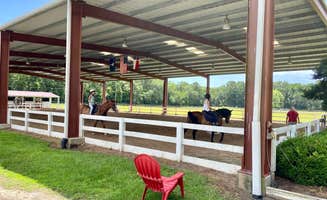Equestrian campgrounds near Charleston, South Carolina offer specialized facilities for travelers with horses. These properties provide dedicated accommodations including water access, electric hookups, and spaces suitable for both equestrian equipment and overnight stays. South Carolina's coastal climate allows for year-round horse camping with mild winters and extended riding seasons, particularly in spring and fall when temperatures average 65-75°F.
What to do
Beach trail rides: At Camelot Farms Equestrian Center, riders can arrange coastal excursions with local guides. "The highlight for us was the ability to ride horses. They provided us with two names of instructors, one of whom graciously squeezed us into her schedule and gave our girls a two-hour riding lesson in their covered arena," notes a visitor from The School for Y.
Covered arena lessons: Horse owners can schedule training sessions with on-site instructors. The covered arena allows for riding regardless of weather conditions, providing protection from both sun and rain during South Carolina's unpredictable coastal weather patterns.
Roadside farm stands: Local agricultural stops near the equestrian properties offer seasonal produce. "There are roadside fruit and veggie stands you pass on the way in that are worth a stop," according to campers who visited the area.
What campers like
Shaded camping areas: The grassy parking areas at equestrian campgrounds provide natural cooling during hot coastal months. According to one camper at Hope Haven Farms, the tree coverage makes a significant difference during summer camping when temperatures frequently exceed 90°F.
Multiple accommodation options: Horse campgrounds typically support various camping styles beyond just RV spaces. This flexibility allows groups with different equipment preferences to camp together while sharing equestrian facilities.
Proximity to beach access points: Most equestrian campgrounds are strategically located within 5-10 miles of horse-permitted beaches. This makes day trips with horses convenient without requiring long trailer drives.
What you should know
Advance booking requirements: Equestrian camping facilities near Charleston fill quickly, particularly during peak spring and fall riding seasons. Reservation windows typically open 3-6 months in advance for prime weekends.
Communication challenges: Multiple visitors have reported difficulties reaching staff by phone. One visitor to Hope Haven Farm noted: "This has been a very disappointing experience" after multiple unsuccessful attempts to confirm arrangements.
Price considerations: Rate increases have affected several properties in recent years. Campers should budget $35-45 per night for basic RV spots with water and electrical connections, with additional fees sometimes applied for horse accommodations.
Payment policies: Some facilities have strict cancellation policies. "If you choose to ride with this company, pay in person at the time of your session," advises one visitor who experienced difficulties with refunds after schedule changes.
Tips for camping with families
Instructor availability: When planning family riding lessons, contact instructors directly well in advance. One family reported: "One instructor graciously squeezed us into her schedule and gave our girls a two-hour riding lesson in their covered arena."
Non-equestrian activities: Pack alternative entertainment options for family members who aren't riding. Most horse campgrounds have limited recreational facilities beyond equestrian amenities.
Weather preparations: Coastal South Carolina experiences frequent afternoon thunderstorms from June through September. Bring appropriate rain gear and plan morning activities when traveling with children during summer months.
Tips from RVers
Dump station access: While most equestrian campgrounds provide electric and water hookups, full sewer connections are less common. Plan accordingly for black and gray tank capacity limitations during extended stays.
Turning radius requirements: Horse trailer combinations require significant space for maneuvering. Sites designated as "big-rig friendly" typically accommodate these needs better than standard camping spaces.
Surface conditions: Grassy parking areas can become problematic after heavy rains. Some RVers recommend having traction mats or boards available, especially during the rainy season from June through September when afternoon thunderstorms are common.


